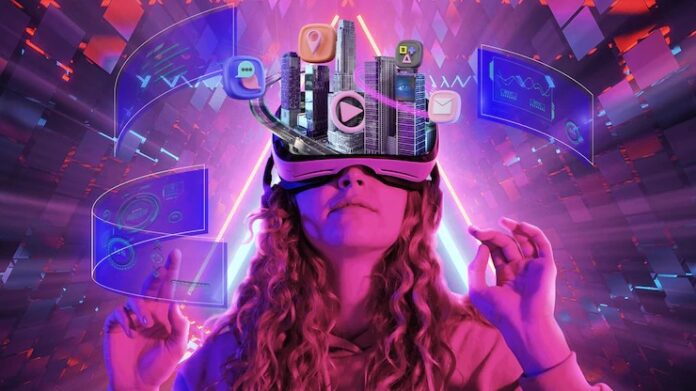The buying potential of end consumers on social media platforms is predicted to reach a staggering $1.2 trillion worldwide by the year 2025. This proves that technology is evolving at a rapid pace. Every day we are introduced to some new or the other new technology and Metaverse is one of them. Still, in its early phase, the possibilities in the implications of Metaverse on Ecommerce are limitless. While many brands have already started taking action to integrate Metaverse into their digital branding, a few others are giving serious thought to incorporating it into their core digital transformation strategy.
What is the Metaverse?
Metaverse is conceptualized by Neal Stephenson, a science fiction author in Snow Crash in 1992. This term however had a profound impact on the owner of one of the leading social media platforms, Mark Zuckerberg. The influence was so deep that we went on to change the name of his social media platform from “Facebook” to “Meta”. Since then “Metaverse” hit the mainstream.
The metaverse is an amalgamation of the real world and the virtual world. It imparts 3D digital spaces to eCommerce brands to facilitate consumers to immerse in online shopping and in-person shopping experience seamlessly through an array of modern digital gadgets. They comprise Augmented Reality Glasses, VR headsets, and beyond. They can also attend concerts, explore virtual stores, ride bikes in a park and even share any beverage with friends.
The beauty of the Metaverse lies in the fact that it is free from the limitations and restrictions of the real world. For example, in a place where sunshine is a rare phenomenon, it becomes possible for the brands to set up decks in sunny weather. Since the whole concept of Metaverse is in its initial phase, even a single project can cost anywhere between $11, 000 to $350 Million, depending on the functionality, cost of the land, project scale and beyond.
The psychology behind the growing hype of Metaverse.
“Exclusivity” is one of the most attractive aspects of the Metaverse. “Twinning” is yet another worth watching the trend of Metaverse wherein physical products become digital products and vice versa.
The technology behind the Metaverse
To be a part of Metaverse, it is imperative to learn about the core technologies involved in it:
Blockchain: Blockchain imparts buying power to the users in the Metaverse with the help of a security system to record financial transactions involving cryptocurrency. Consumers can start buying land in the ‘verse’ or products by easily setting up a Crypto wallet with the help of a Blockchain.
NFTs [non-fungible tokens]: Hailed as exclusive digital artwork pieces, NFTs carry huge value as they cannot be replicated. For instance, every single plot of land on the verse can be sold as an NFT. However, one important point to pay attention to here is that neither all NFTs are wearable nor all wearables are NFTs.
AR and VR [Augmented reality and Virtual reality]: The metaverse is neither a type of technology nor it is a place. It simply refers to a dramatic shift in how consumers interact with the technology, specifically in the domain of VR and AR. Several brands have already launched VR and AR applications to help end-users test and shop their product offerings.
Initial impacts of Metaverse on Ecommerce
Ecommerce brands all across the globe are gearing to embrace this new tech trend to gain a competitive edge in the business by offering a greater bespoke and dynamic shopping experience. A few early adopters high-profile brands such as H&M are toying with the idea of bringing the concept of offering a digital shopping environment to life where people can buy virtual clothes by using CEEK dollars and later on order the same products from its physical stores, as well. A range of luxury brands seems excited about the idea of decoding the nuances of Metaverse as the value offered by Metaverse perfectly aligns with their USPs of scarcity, unique experiences and exclusivity.
Few latest initiatives striving to bridge the gap between the virtual and physical world are:-
Virtual Gucci Garden launched by Gucci
Auction of the first NFT by Coca Cola
Hyundai Mobility Adventure launched by Hyundai
NIKELAND premiered by Nike
Why Ecommerce brands are rooting for Metaverse?
Who does not love exclusivity? This is why more and more brands are keen to impart hyper-personalized shopping experiences. Imagine consumers transcending the barriers of the physical world in the context of geography, gravity, and, time and visiting virtual stores anytime and anywhere. Who knows that in the coming years you will find yourself shopping in a metaverse store.
Yes, that’s true. There is no denial of the possibility that Gen Alpha (Children ages 6 to 16 today) will be of utmost familiarity with the whole concept of Metaverse by the time they become adults. The day is not far when brands of all sizes will pull out all the stops to incorporate Metaverse into their Omni channel digital branding strategy to offer the most unique and seamless experience to their ideal consumers.
So, do you think you will not mind spending extra to experience the uniqueness and take pride in the exclusivity that Metaverse has to offer?


